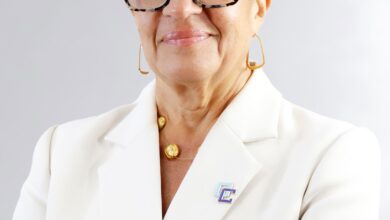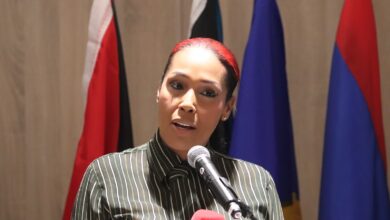(CARICOM Secretariat, Turkeyen, Greater Georgetown, Guyana) On Sunday, March 25, 2007 at exactly 12:00 noon, Eastern Caribbean Time, the Caribbean Community will pause for at least one minute of silence in honour of those who died in the Middle Passage and in resistance to slavery, as the Community marks the beginning of the 200th Anniversary year of the Abolition of the Transatlantic Slave Trade.
Coordinated by the CARICOM Secretariat, the synchronised minute of silence triggers a series of activities planned by several Member States, as well as the CARICOM Caucus of Permanent Representatives at the United Nations Headquarters, to observe this historic event.
The observance is in keeping with the decision of the 18th Inter-Sessional Meeting of the CARICOM Conference of Heads of Government, held in St. Vincent and the Grenadines on 12-14 February 2007, “to commemorate the event with year-long national and regional activities.”
Under the theme, CARICOM Reflects, the CARICOM Secretariat has collaborated with the Government of Guyana in organising a brief ceremony at the steps of the Parliament Building, to mark the day. During this ceremony, a statement from the Chairman of CARICOM, Dr the Hon. Ralph Gonsalves will be broadcast and remarks made by the Secretary General of the CARICOM Secretariat HE Dr Edwin Carrington and the President of Guyana, H.E. Bharrat Jagdeo. The programme will be interspersed with artistic and cultural expressions leading up to the minute of silence at noon.
The Secretariat continues its line up of activities with a Special Lecture on Tuesday, March 27, 2007 at 2:00pm in the major conference room of the Secretariat Headquarters. The Lecture will be presented by distinguished Surinamese writer Cynthia McCleod on the topic: The Role and Position of Women in the Caribbean during Slavery. Cynthia McLeod has written several compelling historical novels and has invested 13 years of historical research in writing the novel, The Free Negress Elisabeth – Prisoner of Color.
Antigua and Barbuda commenced its programme of activities in February with a newspaper supplement in the Daily Observer, a media launch and the opening of a museum exhibition titled “Breaking the Silence.” The programme continues with a series of public lectures, panel discussion, an ecumenical church service as well as a rally at Betty’s Hope Estate on Sunday, where they will be observing a minute of silence.
Similarly, Jamaica launched its celebration in January with a grand rally in the capital’s Emancipation Park, organized for Haiti’s Ancestors Day, in recognition of the struggle of Haiti’s role in the struggle against the slave trade and to honour Jamaica’s national heroes who continued the struggle after the slave trade. Its slate of activities also includes, public lectures, logo competition and symbolic funeral rites for the slaves who died at sea.
Meanwhile, St Vincent and the Grenadines’ schedule of activities includes a series of nine public lectures on various related topics; several History, Civics and Social Studies workshops for both teachers and students and a national concert on Sunday, following the observance of the minute of silence.
St Kitts / Nevis and Trinidad and Tobago will hold national church services on Sunday; Montserrat holds a Panel Discussion on Sunday afternoon; Dominica has organized a ceremony at the historic site, the Barracoon at 6:30 on Sunday and Guyana has planned a cultural evening at the Cultural Centre on Monday, March 26.
In addition to a two hour programme leading to the minute of silence on Sunday, The CARICOM Caucus of Permanent Representatives at the United Nations Headquarters in collaboration with the Department of Public Information at the United Nations has mounted in the visitors’ lobby, an exhibition titled “Lest We Forget – The Triumph over Slavery,” and will host on March 26 a special Commemorative Session of the General Assembly at which the immediate past Chairman of CARICOM, Hon Denzil Douglas will deliver a statement on behalf of CARICOM. This will be followed by a panel discussion on the theme, “Slavery, Our Common Heritage,” in the afternoon with the participation of several academics from the Caribbean, Africa, Europe and the United States.
Other activities, including a cultural extravaganza to showcase the music of the African Diaspora, are also planned for the ensuing months.
Other Member States are expected to unfold their plans to mark the event, during the course of the week 19 – 24 March, 2007.





